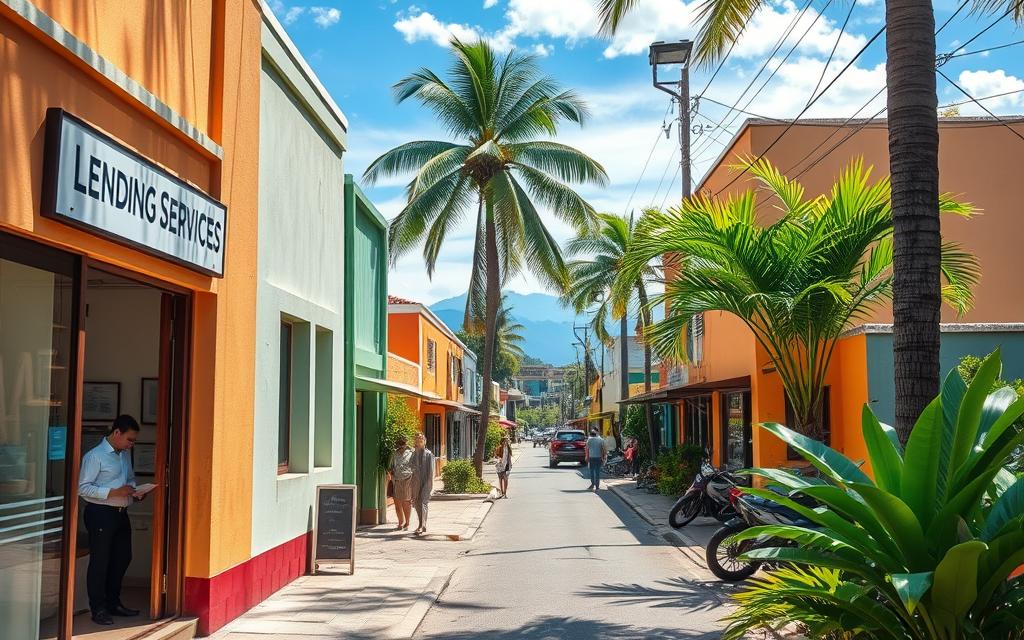
Trust Issues? Here’s How to Vet Borrowers in Costa Rica
Costa Rica’s lending market is experiencing significant growth, with private lending emerging as a vital source of capital for investors and projects. However, this growth also brings challenges, particularly in vetting borrowers to ensure secure investments.
At GAP Investments, we understand the unique needs of foreign and expat investors. Our tailored financing solutions prioritize safety and risk management, providing a secure environment for our investors. With traditional banking restrictions creating a gap in the market, private lenders like us fill this void by offering essential capital to borrowers while earning attractive returns.
To navigate this complex landscape, it’s crucial to properly evaluate borrowers. For more information on securing loans in Costa Rica, visit our guide on understanding how to secure loans. By doing so, lenders can protect their investments and ensure successful lending outcomes.
Understanding the Costa Rican Lending Landscape
Understanding the intricacies of Costa Rica’s lending environment is crucial for successful lending decisions. The Costa Rican lending landscape is distinct from its North American and European counterparts, presenting unique challenges for both lenders and borrowers.

Why Costa Rica Presents Unique Lending Challenges
Costa Rica’s history of abandoned development projects, known as “project graveyards,” has significantly impacted the lending landscape. These projects resulted from poor lending practices and inadequate borrower vetting, making traditional banks cautious and creating a gap in the market that private lenders can fill.
The Reality of “Project Graveyards” in Costa Rica
The phenomenon of “project graveyards” is a stark reality in Costa Rica, with numerous abandoned projects visible throughout the country. As noted by an expert, “Costa Rica is a country full of project graveyards… And the process to foreclose here is a very lengthy process as well.” This situation underscores the need for careful borrower vetting and robust lending practices.
Why Traditional Bank Financing Is Often Unavailable
Costa Rica’s banking landscape is characterized by strict lending policies that limit access to financing. This reality often surprises foreigners and non-residents who are accustomed to more lenient lending practices in their home countries.
Banking Restrictions for Foreigners and Non-Residents
Banks in Costa Rica are cautious when dealing with foreign borrowers due to the challenges associated with debt collection in the event of default. Without local residency, banks lack the necessary legal recourse to recover debts, making them hesitant to approve loans.
Historical Factors That Led to Strict Lending Policies
The early 2000s saw a real estate boom in Costa Rica, which unfortunately led to numerous defaulted loans and abandoned projects. This period of financial instability prompted banks to reevaluate their lending practices, resulting in the strict policies we see today.
Current Bank Requirements and Limitations
To qualify for a loan, banks typically require Costa Rican residency, local income verification, and properties located within the Central Valley. Even then, the approval process can be lengthy, and upfront fees are high. Banks are generally unwilling to finance land purchases or properties in tourist areas, further limiting options for potential borrowers.
These limitations have created opportunities for private lenders to fill the financing gap, offering alternative solutions for those unable to secure traditional bank financing.
Private Lending in Costa Rica: A Viable Alternative
In Costa Rica, private lending has emerged as a crucial financing option for investors and property buyers. This shift is largely due to the limitations and strict requirements of traditional bank financing in the region.
How Private Lending Works in the Costa Rican Market
Private lending in Costa Rica operates through a network of individual investors, investment groups, and specialized lending companies. Unlike traditional banks, private lenders can offer more flexible terms and faster approval processes, making it an attractive option for those looking to secure funding quickly.
The private lending market has evolved significantly, moving from informal arrangements to more structured and professional lending operations. This evolution has created a wider range of financing options for borrowers.
Benefits Over Traditional Banking Options
Private lending offers several advantages over traditional banking, including faster access to funds, more flexible repayment terms, and the willingness to finance properties in tourist areas. For investors, private lending in Costa Rica also presents an opportunity to earn higher returns compared to traditional investment vehicles, with the security of being backed by real property.
Essential Steps to Vet Borrowers in Costa Rica
Effective borrower vetting is the cornerstone of successful private lending in Costa Rica’s unique financial landscape. At GAP Investments, we have developed a comprehensive vetting process based on years of experience in the Costa Rican market, helping to minimize risk while identifying qualified borrowers. Our loans range from $50,000 to over $3,000,000 USD, with competitive interest rates of 12% to 18% annually.

Property Evaluation and Due Diligence Process
Property evaluation begins with a comprehensive physical inspection and market valuation to establish an accurate loan-to-value ratio. This step is crucial in determining the property’s value and ensuring that it serves as sufficient collateral for the loan.
Legal Documentation Requirements
Legal due diligence must include verification of a clean title, absence of liens or encumbrances, and confirmation that the property is properly registered in the National Registry. Documentation requirements include property registration documents, survey maps (planos catastrados), tax payment verification, and proper identification of all parties involved.
Assessing Borrower Financial Stability
Assessing borrower financial stability requires reviewing income sources, credit history (where available), existing debt obligations, and business plans for investment properties. For foreign borrowers, additional verification steps may be necessary, including international credit checks and verification of offshore income sources.
Loan Structures That Protect Your Investment
The diverse loan structures available in Costa Rica offer lenders various options to secure their investments. When lending in this market, it’s crucial to understand the legal and financial implications of each structure to protect your investment effectively.
Mortgage Contracts vs. Secured Interest Trusts
Mortgage contracts and Secured Interest Trusts are two primary loan structures used in Costa Rica. Mortgage contracts, regulated by the Civil Code of Costa Rica, create an encumbrance against the property that can be foreclosed upon in case of default, providing strong legal protection for lenders. On the other hand, Secured Interest Trusts involve transferring property ownership to a trustee who holds it as collateral, potentially offering faster enforcement in case of default. At GAP Investments, we typically use first-degree mortgages for most lending situations, providing strong security while maintaining reasonable costs for borrowers.
Other Security Instruments Available in Costa Rica
Beyond mortgage contracts and Secured Interest Trusts, other security instruments are available in Costa Rica, including mortgage bonds (Cédula Hipotecaria), bills of exchange, and promissory notes. Each of these instruments has varying levels of security and enforcement mechanisms. Understanding the advantages and limitations of these security instruments allows lenders to choose the most appropriate structure based on the specific circumstances of each loan, thereby protecting their investment in Costa Rica.
Setting Appropriate Loan Terms and Interest Rates
As private lenders in Costa Rica, we understand that determining appropriate loan terms and interest rates is key to balancing risk and return. Our experience has shown that a combination of factors influences these decisions, including property location, borrower profile, and loan-to-value ratio.
Determining Optimal Loan-to-Value Ratios
Loan-to-value (LTV) ratios play a crucial role in determining the risk associated with a loan. Generally, lower LTVs (under 50%) qualify for more favorable interest rates. We consider the property’s value and the loan amount to determine the LTV ratio, which significantly impacts our interest rate decisions.
Interest Rate Considerations Based on Risk Factors
Interest rates for our loans in Costa Rica range from 12% to 18% annually, depending on the risk assessment. Factors such as property location, loan purpose, and borrower creditworthiness influence the final interest rate. For instance, properties in established tourist areas typically qualify for better rates than those in remote locations.
- Loan terms typically range from six months to 3 years.
- Structuring loans with interest-only payments in the first year can help borrowers manage cash flow.
- Our loans range from $50,000 to over $3,000,000 USD.
Risk Management Strategies for Private Lenders
To navigate the complexities of Costa Rica’s lending landscape, private lenders must employ comprehensive risk management techniques. Effective risk management is crucial for protecting investments and ensuring the long-term success of lending operations.
Creating a Diversified Lending Portfolio
Creating a diversified lending portfolio is a key strategy for mitigating risk. By spreading investments across different property types, locations, and loan sizes, private lenders can reduce their exposure to any single market segment. This diversification helps to minimize potential losses and maximize returns. For more information on our lending process, visit our website.
Working with Local Experts and Legal Counsel
Working with experienced local legal counsel is vital for navigating Costa Rica’s unique legal framework. Local experts can ensure that all security documents are properly executed, and loans are structured to minimize risk. Additionally, understanding and planning for currency risk is crucial, as loans are typically denominated in US dollars, while local economic factors may impact borrowers’ ability to repay.
GAP Investments’ Approach to Private Lending

At GAP Investments, we have developed a tailored approach to private lending in Costa Rica, focusing on the unique needs of foreign and expat investors. Our comprehensive lending process prioritizes security, transparency, and mutual success.
Our Lending Process and Evaluation Methods
Our lending process begins with a thorough property evaluation and borrower assessment, conducted by our experienced team who understand the local market dynamics. We assess borrower financial stability and evaluate property value to determine loan amounts.
How We Structure Loans for Mutual Success
We structure loans with terms ranging from six months to 3 years, with loan amounts from $50,000 to over $3,000,000 USD. Interest rates typically range from 12% to 18% annually, determined by loan-to-value ratio and other risk factors. Our primary security instrument is a first-degree mortgage, providing strong legal protection.
GAP Investments offers opportunities for private investors to participate in our lending program, earning attractive returns secured by real property in Costa Rica. Our team includes experts in Costa Rican real estate, law, and finance, ensuring comprehensive risk assessment and proper loan structuring.
Conclusion: Building Trust in the Costa Rican Lending Market
In the realm of Costa Rican private lending, trust is the cornerstone that supports successful transactions. By understanding the unique challenges of the Costa Rican lending landscape and implementing thorough vetting processes, private lenders can minimize risks. GAP Investments has established itself as a trusted partner, connecting qualified borrowers with investors seeking secure returns in the Costa Rican real estate market.
For more information on private lending opportunities in Costa Rica, contact GAP Investments at +(506) 4001-6413 or [email protected].
Article by Glenn Tellier (Founder of CRIE and Grupo Gap)
